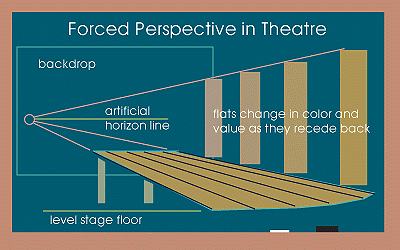![]()
18 forced
 |
Several questions have arisen about using perspective to create an illusion in real space. A Chalkboard visitor wanted to know more about how perspective could be used to create an illusion in theatre sets. Creating illusions in real space using three-dimensional objects has been done for centuries. The ancient Greeks used it in their architecture by making their columns slightly smaller at the top. This created the illusion of much greater height to someone who was standing at the bottom. The first rule for creating the illusions of perspective in real space is to control how your audience views the environment. For perspective to be convincing the audience have in common a horizon line, vanishing point(s), and convergence lines. The viewer of ancient Greek columns is standing at a specific point (on the ground). In a theatre it is relatively easy to control where your audience views the environment. They are seated or standing in a pre-determined place. To create the illusion of a deep space in a controlled space like a stage area, the use of a raked or inclined stage can help. This is accomplished by making the stage incline away from the audience. The background should support the illusion through the use of an artificial horizon line. This would be a horizon line that corresponds to the stage, but does not necessarily reflect the receding lines of the theatre itself. Flats should also shrink somewhat as they recede back to this artificial vanishing point. To make this even more convincing, one may use the attributes of atmospheric perspective on the flats and stage floor to influence the audience's perception. This can be accomplished by making color and value change as it recedes back. Smaller props could also be introduced into the background for more convincing depth. A good example of forced perpective in film is a scene from "Willy Wonka and the Chocolate Factory." As Mr. Wonka and the children are about to enter the chocolate factory, they encounter a room that appears to be a long hallway, but it turns out to be a room that physically changes in size to create an illusion. |
| Back to 17 |